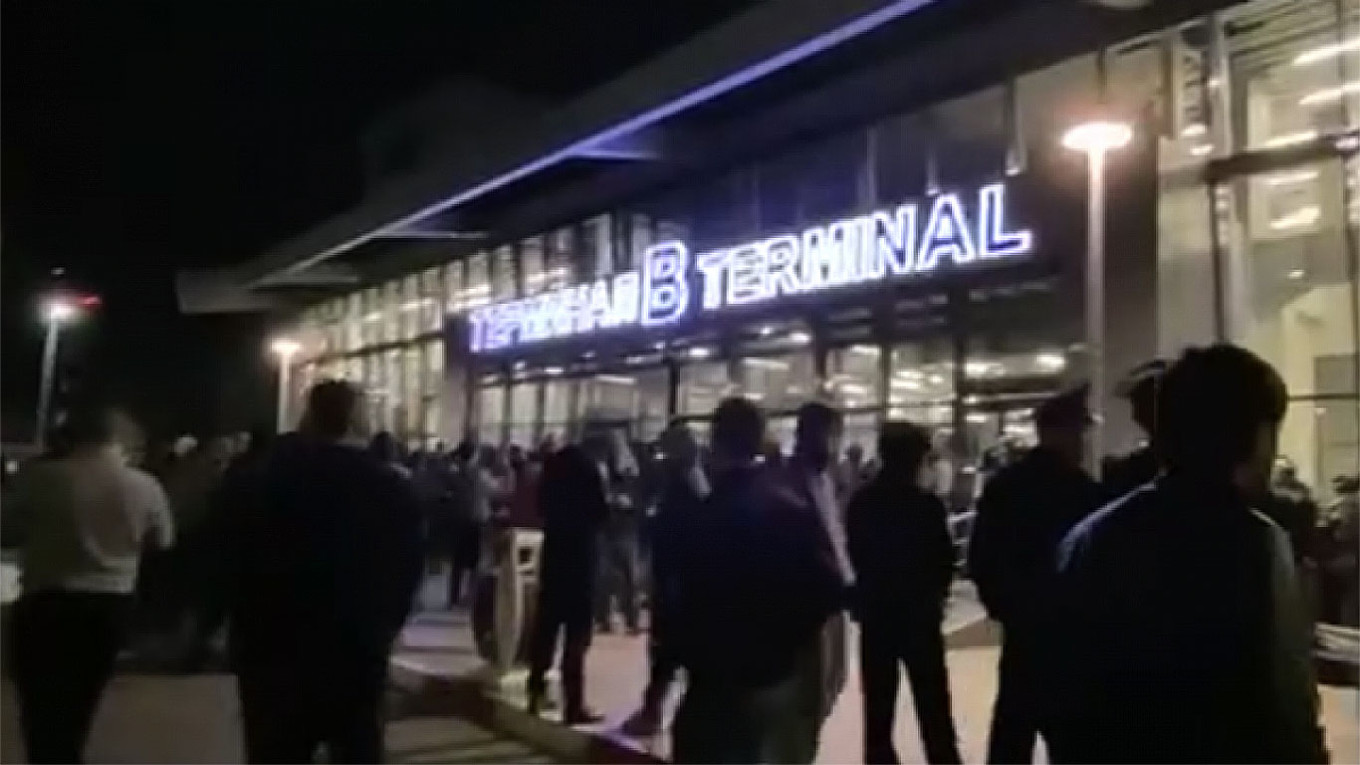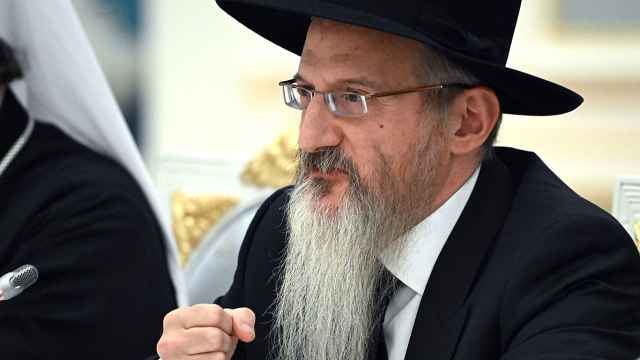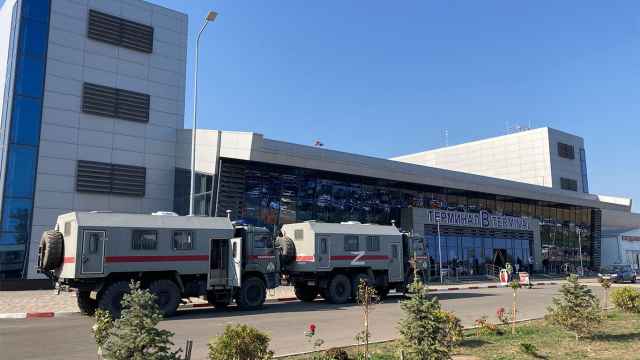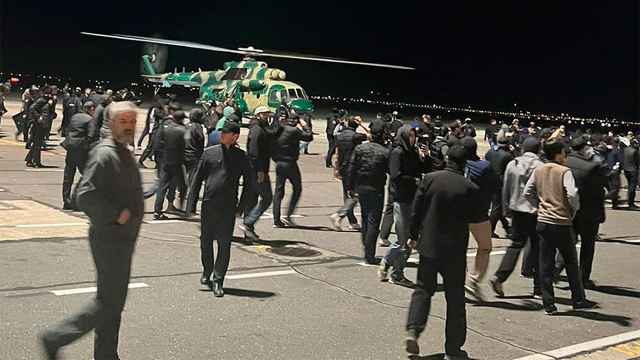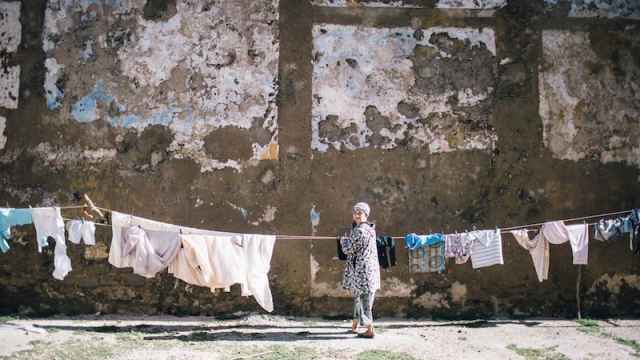Who is responsible for the violent mob attack on passengers arriving from Israel at Makhachkala airport? Is it sinister, imported fundamentalist Islamic influence rising against the waning clout of traditional Islam? Ukrainian agents running psyops with Western funding? Russia’s history of pogroms against the Jews?
These explanations, proffered by people far away from the North Caucasus with little understanding of it, neglect the accountability of the men who on that day formed a mob, stormed the airport and assaulted passengers and personnel. This neglect echoes a pervasive mindset across the region: when men claim righteous anger and feel offended, they must not be held responsible for their actions, even if they deliberately engage in violence. What is more, the people who offended them are responsible for the ensuing violence, and so they had better atone for it. This way of thinking is also applied to wife-beating, so-called honor killings and political violence.
The airport riot on Oct. 29 was not the first time in Dagestan’s recent history when mobs of men bayed for blood. Several times in recent years, similar agitated mobs of bearded men have turned on local women and teenage girls who had the temerity to live as they choose — whether by putting on a pink wig and attending an anime festival, fleeing abusive families, or something as simple as being with the person they love.
Each time, local authorities not only failed to stop these mobs, but sympathized or even colluded with them. Each time, there was no response from Moscow.
For many years, local women have waited for such a response. They have endured honor killings; child marriages (on live television); the kidnapping of women who have fled their families; the violent separation of children from their mothers; police raids on domestic violence centers; paintball attacks on unveiled women, and the online shaming and doxing of women who fall foul of the region’s stringent social and gender codes. But help never came.
Moscow’s decades-long silence in the face of this violence and systemic subversion of the rule of law is symptomatic of the bargain the Kremlin has made with the North Caucasus. In return for collaboration over national security and a fragile peace in a region that has seen horrific violence, Moscow has turned a blind eye to local men who throw women, children, minorities and other vulnerable groups to the wolves. The wolves in this metaphor can be old or young, proponents of either Salafist or traditional Islam, or perhaps neither. They include representatives of the authorities and their aggrieved opponents, or just random communities and families. Whatever form they take, they always think they are entitled to violence and must be indulged.
The airport mob shows the chickens of that policy coming home to roost. Does looking like an antisemitic cesspool to the world amount to a matter of national security? Judging by Moscow’s worried reaction, it does.
To be completely fair, relations between the Kremlin and the North Caucasus are fiendishly complicated and hard to get right. A more determined effort to reign in local powerholders and ideologues, or to enforce Russian law for all equally, may well result in violent unrest like that of the 90s and early 2000s.
If local attitudes about sacred rage enabled the airport mob, they do not tell us what triggered it or what the origins of this hatred for Jews are. We need to frame our analysis of contemporary Dagestan correctly, by centering the experiences of all its people.
For many years, I was struck by the even-minded and favorable views of Israel among my contacts in the North Caucasus. Since the 1990s, the influx of jihadists and their ideologies during armed conflicts (painted as religious wars by all sides) created no particular awareness of the Palestinians’ predicament, nor hatred for Israel. Most viewed Israel through a generic post-Soviet lens: a high-functioning country where their (or their mother’s) teacher, classmate or neighbor had emigrated for a more comfortable life.
They saw it as a place where Russian-speaking clinics provide high-end medical care to patients from all over the Russian-speaking world, where they could access cutting-edge Russian-language expertise on working with survivors of torture or other traumas born from the region’s conflicts. It barely occurred to them that there must be a reason for all that knowledge.
Was the raging antisemitism we just saw in Dagestan caused by everyone’s favorite bugbear, Salafism? This imported fundamentalist form of Islam is denounced by Moscow and beyond as a threat to national and even global security. It is also seen as a threat to the region’s so-called traditional Islam which, in this telling, would never have permitted such violent excesses. This pining for Dagestan’s local brand of Islam rests on a superficial, rose-tinted version of the past. It has proven capable of violent, xenophobic mobilization time and again. However, it must be said that there is no history of pogrom-like violence against Dagestan’s ancient community of Mountain Jews, who were not the targets of last week’s mob.
Besides, this juxtaposition of traditional local and modern imported forms of Islam has not reflected reality for quite a while. It reads like early post-Soviet history. Dagestanis have been synthesizing, adapting and creating new forms of religiosity for decades. The young men who first embraced a more puritan, fundamentalist theology in the 1990s are grandfathers today. They are elder statesmen of a well-established community that is inextricably, if uneasily, integrated into Dagestan’s society. Of course, the religious revival across the North Caucasus has resulted in greater exposure to global Islamic discourse and institutions and thus more awareness of the stories that move Muslims around the world. That includes the experiences of Palestinians. But so did globalization, travel, study, the internet and especially social media.
Across this region, people are extremely online. In part, that is because restrictive social mores and political repression push people into safe, virtual spaces. In part it is because messenger groups and channels help maintain the social connections that play such an existential role in these communities. There is also a clear preference for visual formats – like Instagram and TikTok – across demographic groups. Images matter, a lot.
Remember how Westerners responded to the first images from Russia’s invasion of Ukraine? They saw children who looked just like theirs. That response resulted in unprecedented empathy and generosity. That is what people in Dagestan or Chechnya see in the images of Palestinian children bloodied, wailing, dead and covered in debris. It is not just their dark locks and long-lashed eyes that provoke this response. Their tiny burial shrouds and dusty little bodies evoke the dark days of the battle of Grozny or the Beslan school siege. The pain, grief and anger across the North Caucasus are real, raw and very deeply felt.
The Salafi elder statesmen in Dagestan are now shifting the blame on to local authorities. Their argument goes that the authorities did not permit a pro-Palestinian demonstration where these agitated young men could have vented their righteous anger. Being men, agitated and offended, the airport mob could not possibly contain their violence. Therefore, they should not receive harsh punishment. If they do, many more local men will get angry. Then they also cannot be responsible for their actions.
The challenge for Dagestani authorities and civil society will be to allow locals to express their grief, pain and solidarity freely and safely. They cannot be allowed to excuse mob violence as righteous anger, as they have so many times before.
A Message from The Moscow Times:
Dear readers,
We are facing unprecedented challenges. Russia's Prosecutor General's Office has designated The Moscow Times as an "undesirable" organization, criminalizing our work and putting our staff at risk of prosecution. This follows our earlier unjust labeling as a "foreign agent."
These actions are direct attempts to silence independent journalism in Russia. The authorities claim our work "discredits the decisions of the Russian leadership." We see things differently: we strive to provide accurate, unbiased reporting on Russia.
We, the journalists of The Moscow Times, refuse to be silenced. But to continue our work, we need your help.
Your support, no matter how small, makes a world of difference. If you can, please support us monthly starting from just $2. It's quick to set up, and every contribution makes a significant impact.
By supporting The Moscow Times, you're defending open, independent journalism in the face of repression. Thank you for standing with us.
Remind me later.



